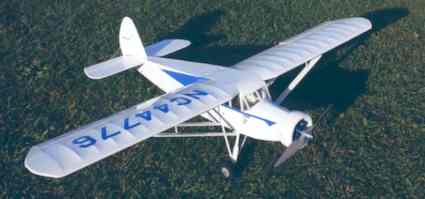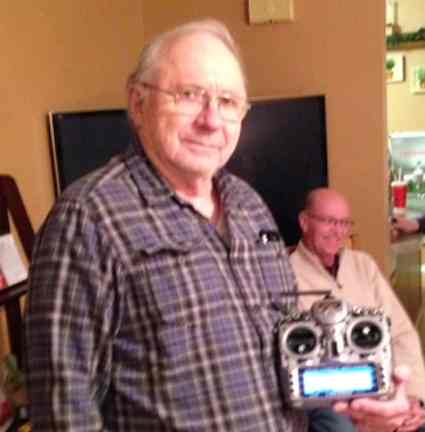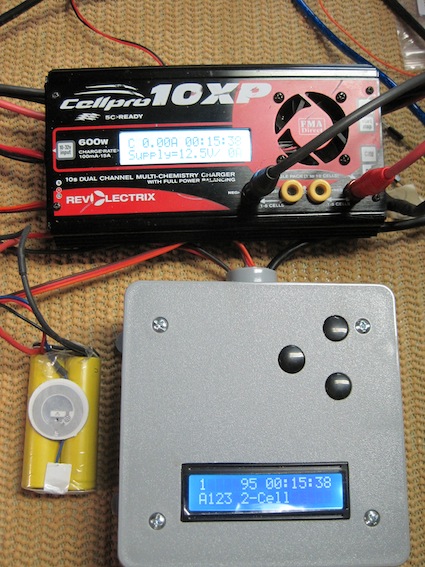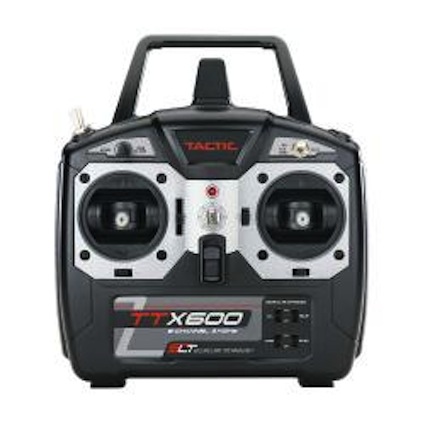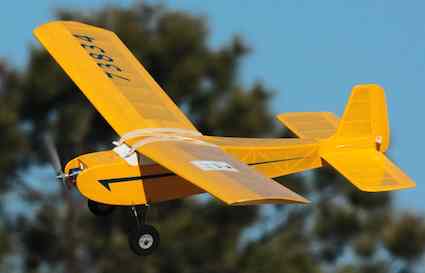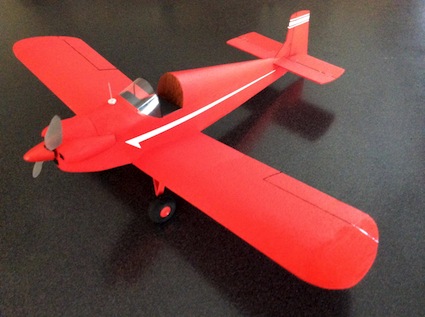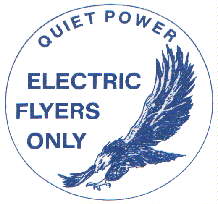 |
Flying High With Electric Power!
The Ampeer ON-LINE!
Fly the Future - Fly Electric! |
Site Table of Contents
| President: | Vice-President: | Secretary/Treasurer: |
| Ken Myers | Richard Utkan | Rick Sawicki |
| 1911 Bradshaw Ct. | 240 Cabinet | 5089 Ledgewood Ct. W. |
| Commerce Twp., MI 48390 | Milford, MI 48381 | Commerce Twp., MI 48382 |
| (248) 669-8124 | (248) 685-1705 | 248.685.7056 |
 | ||
| Board of Directors: | Board of Directors: | Ampeer Editor |
| David Stacer | Arthur Deane | Ken Myers |
| 16575 Brookland Blvd. | 21690 Bedford Dr. | 1911 Bradshaw Ct. |
| Northville, MI 48167 | Northville, MI 48167 | Commerce Twp., MI 48390 |
| 248.924.2324 | 248.348.2058 | 248.669.8124 |
| Mailed Ampeer printed subscriptions are no longer available.
The Ampeer is FREE on-line in Acrobat .pdf format and HTML with active links! | ||
| The Next EFO Meeting:
Date: Wednesday, March 11 Time: 7:30 p.m. Place: Check the EFO Homepage for location | ||
| What's In This Issue? | ||||
| Hobbico to Visit Our Area at the Ultimate Soccer Arenas for Two Days in April! Event Announcement. | Curtiss-Wright Air Sedan, Dick Flemming describes his research and build. | |||
| The January EFO Meeting The happenings at the January meeting. | More On Dave Stacer's Charger Monitor/Logger Dave shares a bit more about his charger monitor. | |||
| Inside the Tactic TTX600 Non-computer 6CH 2.4GHz Radio Dave Stacer takes apart his Tactic TTX600 and shares what he 'found' in photos. | Eze-Kote Tip For 2nd Coating Arthur Deane shares what he learned about adding a 2nd or 3rd coat of this product. | |||
| Mambo Revisited Bill Bowne shares details on his recreation. | Peanut Druine Turbulent Jeff Kelety tells us where his build thread for this little cutie is located, with photo. | |||
|
From Joe Hass Get a jump on the Toledo Show, which is scheduled for April 10, 11 & 12 this year. Hobbico's first visit is on the evening of Monday, April 6, from 7 p.m. to 9 p.m. at the Ultimate Soccer Arenas in Pontiac, MI. Hobbico will also be represented again on Tuesday, April 7, from 11 a.m. to 1 p.m., the regularly scheduled indoor flying time. The Frank Noll, Futaba Team Manager, is the scheduled representative. There will be a lot of pilots' prizes, so you really don't want to miss this one. The event is sponsored by M.I.A.A. The contact for the event is Joe Hass at 248-321-7934 or joehass@gmail.com. Curtiss-Wright Air Sedan
Ken, I have always liked the looks of the cabin, high winged planes of the 1930s. Last summer I decided to build one and looked around for a good prototype. I found one in an old Model Builder magazine. There were plans for a 'Peanut' rubber band model of a Curtiss-Wright Air Sedan, model CW 15 and a small three view of it. It is typical of this type of aircraft built by Travel-air, Bellanca, Stinson and others in that era. The CW is a 4 place, 1931 version. After a search on the Internet, I found that only 15 CW 15s were built, variously powered by six and seven cylinder radial Curtiss-Wright engines and five cylinder Kinner radials. At least one CW 15 was on display at a historic aircraft restoration museum, Creve Coeur, Missouri in 2006 My model is powered by a Himax 3510-1000 and three cell LiPo for about 250 watts in. It powers the 2 lb. 7 oz., 49" span plane with substantial aurhority and most flying is doen at about half throttle stick position. The first flight exceeded my expectations and went very well. I suspect the full scale would not climb at an eighty degree angle, loop, and roll as well as the model does. The full scale had unusually long landing gear and rather large wheels. I suspect this was a result of flying from the unimproved runways of the period. The January EFO Meeting The well attended meeting was held at Ken Myers' house. Just about everyone brought something to share. 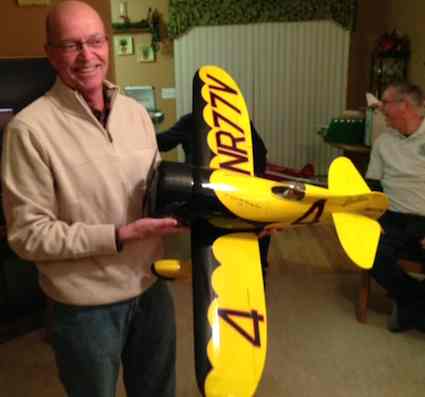 Denny Sumner lead off describing his beautiful, new Gee Bee. It was built from a Manzano Builder Kits Mckellar GeeBee Z - 42". It is covered with The World Models Lightex. He had Callie's graphics but ended up using most of them for patterns for the scallops on the wing, fuselage, and wheel pants. All up weight after covering is 34 ounces. 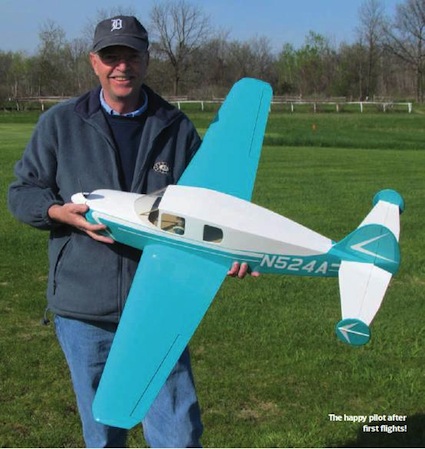 Denny's construction article for his Bellanca Cruisemaster was in the January 2015 Model Airplane News. The photo of Denny and his Bellanca, at the top of the next column, is from his article in Model Airplane News.
Tom Bacsanyi shared the features of his new FrSky Taranis Plus radio system from Aloft Hobbies. He had the system set up in a F-16 EDF to demonstrate just some of its amazing features. The Taranis Features Include: *Full Telemetry RSSI alarms (warns you of signal reception problems before disaster can strike)
Tom demonstrated just a few of these features for us. The S-bus, serial connection of servos and Smart-bus, serial connection of the various types of telemetry sensors, was extremely interesting! The Taranis 16-channel transmitter sells for $200 and combined with a X8R 16 channel receiver, $225. Keith Shaw noted that he has been flying the FrSky equipment for about four years now and it is 'rock solid'. FrSky has an internal module that Keith has used to upgrade his favorite Multiplex Cockpit transmitter. There are a lot of threads in the Radios section of RC Groups regarding this transmitter. A lot of help is available there. Bruce, at RC Model, Reviews also has a lot of nice words to say about the FrSky systems and the Taranis.
It should also be noted that Tom IS a radio man. If he says this thing is really good, it is!!! 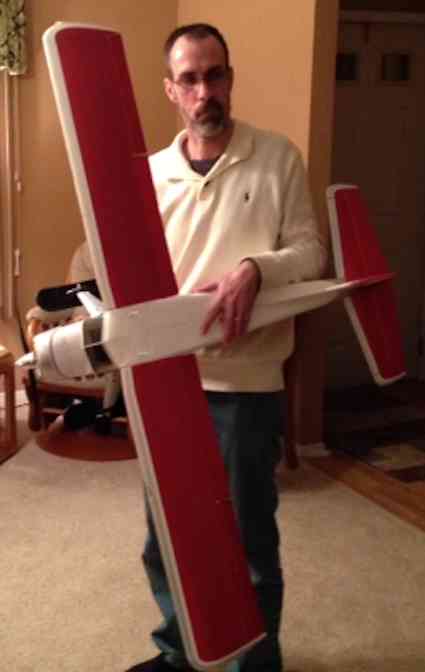 Owen Morgan brought along his Flyzone Island Wings DHC-2 Beaver and Hobby People Waco. Both had skis mounted for winter flying. He is using the Lemon DSM2 receivers in both planes. He noted that the Waco was "crazy tail heavy" on its first flight when balanced at the supplier's recommended CG. He purchased the Waco on sale for $99. Flyzone Island Wings DHC-2 Beaver 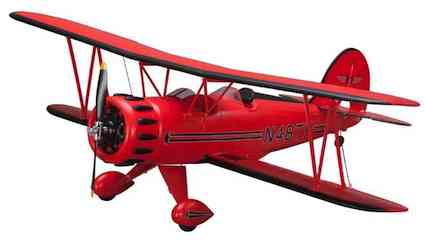 The Waco photo comes from the Hobby People Web site. I forgot to get a picture of Owen with his plane. Keith Shaw noted that he had actually flown in the full scale Island Wings DHC-2 Beaver and had talked extensively with the owner, a lady pilot, about her restoration. We all wish Owen a speedy recovery from his brain surgery. 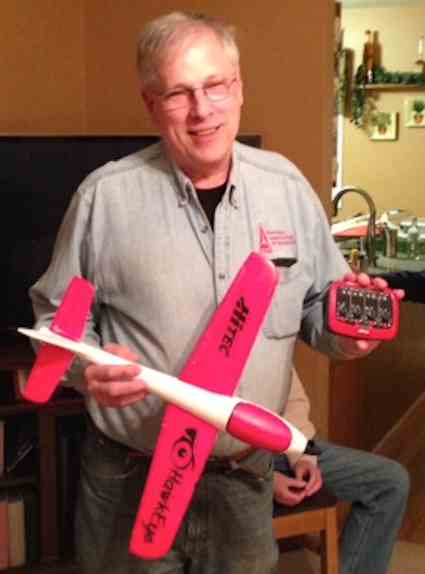 Roger Wilfong shared a couple of Hitec products that he's been using. The first was the Hitec Hitec X4 Micro AC/DC 1 Cell LiPo Charger. It is an AC/DC charger that can charge 4 single cells from 0.1 amps to 1 amp. It accommodates the four most common connector types; Molex, Reversed Molex, MX, and mCPX. It is short circuit, over current, reverse polarity, and DC input voltage protected. Keith Shaw noted that he found it to be truly four independent chargers in a single case. Roger also had his Hitec Hawkeye Hand Launch Glider conversion with him. He used the 'guts' from an E-flite UMX Beast BNF including the radio and power system for this conversion. His version uses both ailerons and rudder, but he noted that either the ailerons or the rudder can be used without using both. This model can 'zip right along' and eats up sky rather quickly in the HUGE Legacy Center Dome when flying indoors. 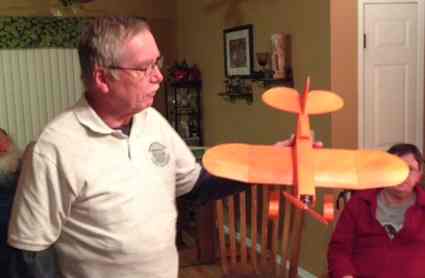 EFO vice-president, Richard Utkan, brought his Flitetest Old Speedster. It is made with Dollar Store foamboard and finished with a very light coat of paint. It uses an old GWS brushless outrunner. Richard also brought along a kit that he'd picked up and wanted help in identifying it. Roger Wilfong came up with the correct answer. It is a Graupner Fokker Eindecker E III. 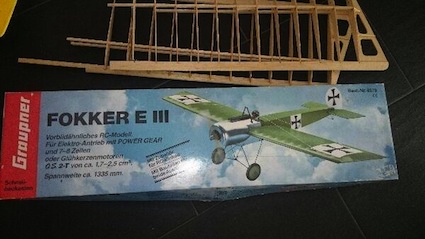 Roger found an image of a matching plane on the Internet. Obviously, Richard's was 'missing' the box. Also, a little more background on the kit can be found in the February 2001 Ampeer. 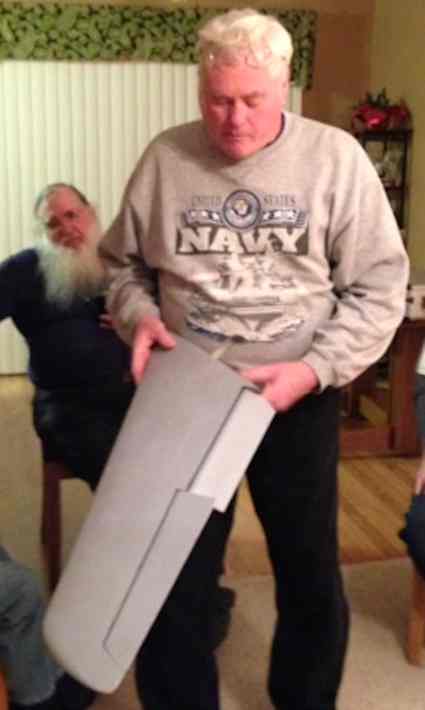 Hank Wildman brought along the wings of the Byron F-86 he's working on. There was more on this plane in the January 2015 Ampeer, December EFO meeting. He noted that he’s using an 'odorless' primer and paint on it, and it is working out very well. He'll have more information on the paint soon. 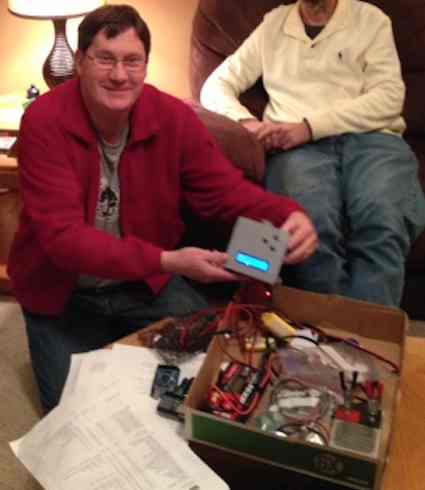 Dave Stacer has been working for many months on an 'oh dang I forgot to note the mAh that went back into the battery before I hit the stop button or disconnected the battery' device. Many of us use the FMA (Revolectrix) CellPro 10S or 10XP chargers. We've also noted that sometimes, when we have a questionable battery on charge, that we want to note the mAh returned to the pack and even maybe the time to charge, we 'accidentally' turn off the charger by hitting the stop button. Once the stop button is hit, all the data logged by the 10XP goes away. Dang! Dave has created a device that logs the data to an SD card that can then be read in a C-program that he wrote. The device also uses RFID tags to identify the battery. He's placing the tags on his removable LiPo packs, and in the planes with A123 cells that he charges in situ. To create the device he need the source code for the CellPro 10XP. FMA was not willing to provide it to him. He located and used the source code for the PowerLab as his starting point. He found that basically the same code is use for the 10XP and the Multi4 Charger. With a lot of detective work, he was able to understand the data being output by these Revolectrix chargers. He said that this project has been extremely time intensive to get the prototype working, but a great mental exercise. He also noted that a simpler method would be to carry a notebook and put a 'warning' label on the charger to not disconnect until after logging the data. (Not sure that would work for me. I forget just way too easily. KM) We can't wait to see it working at the field this spring. Ken Myers showed the new Tactic TTX850 transmitter. He pointed out a few of its new features, as several of the club members have the Tactic TTX650. He also noted that while not the whiz-bang unit that the Taranis is, it is an extremely reliable, feature rich, good value system. He said that if you are a Tower Hobbies Super Saver member you can get the 8-channel transmitter and two Tactic TR625 6CH dual antennal receivers for less than $200. An excellent deal on a very good product. Ken's full review was in the February 2015 Ampeer. Next he showed an RC Models Review Video on how to locate a downed model using Received Signal Strength Indication (RSSI). The video is titled, "Finding lost RC planes using telemetry". Ken also set up aerofly RC7 and let everyone take a turn at flying using the TTX850 transmitter. Ken's review aerofly RC7 was in the December 2014 Ampeer. It was decided during the meeting that we can return to using the 2nd Wednesday of the month as our meeting night. The next meeting will be Wednesday, March 11. With all of the topics covered during the meeting, there was a lot to talk about as refreshments were served. It was another fun and very informative EFO meeting! More On Dave Stacer's Charger Monitor/Logger
I'm bringing the charge monitor/logger to show at the January EFO meeting. It's far enough along to demo. It's not quite ready for the flying field yet, but I have a few months yet. I've attached a photo. It looks a little industrial - the box needs some labels. Finding some kind of case was maybe the hardest part. I'm excited to show of my project. I thought I was already to go about a week ago, but then discovered the program had a problem when it was not connected to a computer. That was not good. It took a few hours to find that bug. Inside the Tactic TTX600 Non-computer 6CH 2.4GHz Radio
I received an email from Dave showing some of the insides of the Tactic TTX600, which has now been replaced by the Tactic TTX610. Ken, Here are some photos from the inside of the Tactic TTX600.  The red circle circles the 2.4 antenna. Note that it is just a trace on a circuit board. (It is not that red thing sticking up, but the trace on the circuit board. KM) The Blue circle is the 2.4 chip. It's a Nordic nRF24L01+. The Black circle is the CPU. It's a Atmel ATmega48P.  Here is another photo of the inside. The red circle is where the antenna is on the printed circuit board on the other side. Notice that nothing is connected to or in the plastic nub simulated antenna area. 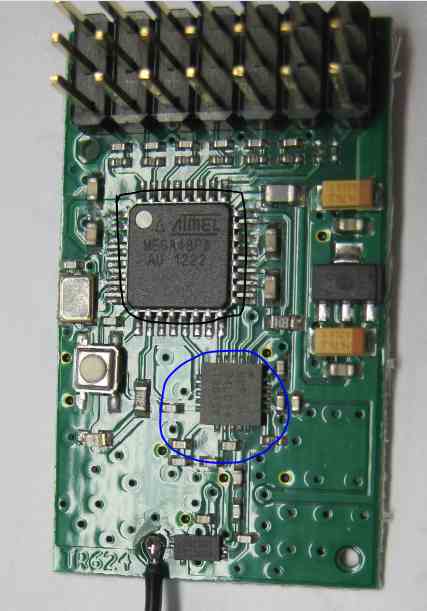 Here is a photo of the Tactic TR624 "receiver" unit. The Blue circle is the 2.4 chip. It's a Nordic nRF24L01+. The Black circle is the CPU. It's a Atmel ATmega48P. For the record, I've had a history of taking my toys apart. I can remember back as far about 9 years old, taking a toy train apart to see how it made its noise. The difference now is that, I can put them back together and they still work. Eze-Kote Tip For 2nd Coating
Ken, I thought that Eze-Kote users may be interested in the following exchange. When using a second or third coat of Eze-Kote over a balsa structure covered with glass cloth, the Eze-Kote will not spread evenly over the surface. It forms streaks and results in an uneven surface when cured. What can I do to prevent this? Mine may be a year old now. Should I dilute Eze-Kote with water? Use a softer brush? Any thoughts would be appreciated. Thanks,
From: John Bristow john@deluxematerials.com
Add one drop of detergent into 500ml of water. Wipe that over the surface and allow to dry. Try again. Lightly abrade the surface or even add 2-3 drops of the detergent solution above to the Eze-Kote. It's a surface tension effect. Let me know, and good luck. John Mambo Revisited
I saw your Min-E Mambo in the Ampeer, so I had to send you a shot of mine. I redrew Gene Rock's plans via TurboCAD for Electric and resized it to 252 sq. inches. Power is a Skatty 450 brushless on a 3S1250mAh Rhino pack, turning an APC 8x3.8 slow-flyer prop. She weighs 16 oz. and is covered with Fibafilm (Micafilm). She's a blast -- snaps, spins, flat spins, you name it, she'll do it. I've even added a set of Stephens' Aero floats, with which both Micki and I had our first ever float flying. I submitted the plans to RCMW the beginning of February,so you should be seeing them published some time this year. I suspect it'll be a free plan, due to the size. For several years, the Mambo 252 has been both our relaxed flying model and our model to fly in iffy weather. It's so stable and reliable when throttled back, yet can be so agile when the go stick is pressed forwards. I'm considering building another, but I'm also thinking of building a mini A-Ray (had two, loved them both). Bill and Micki Bowne Hi Ken, When the Mini Mambo kit was in hobby shops, I wasn't able to afford a radio. Then, by the time I could, I couldn't fit my early digital rig (MRC F-710) into something so small. So, this was the first time I actually got to build and fly a Mambo. Even then, I had to rely on Gene's drawings and not ones from an original kit, so I'm not familiar with the concave sides. To be honest, I don't know if I ever saw a Mambo of any sort at a model field. I just remembered the kit from times I spent at the local hobby shop, looking and dreaming. I did change the internal structure quite a bit. The sides are 1/32" sheet with 1/8" framing and the wings are an "I" beam. I just couldn't make the wing bolt on, though. That just wouldn't have looked right. :-) It was a bit of a task to get it off. I got as much removed, and picked off, as possible. The stuff that just wouldn't budge was covered with masking tape so that it would not show through the new covering. KM Nothing wrong with relaxed puttering! We usually fly when no one else is at our field, and sometimes I sit in a lawn chair whilst doing circuits and bumps for up to 15 minutes. Very relaxing! I've also used the Mambo to introduce some newbies to the hobby, as it's just so amiable a plane when throttled back. Cheers,
Peanut Druine Turbulent
Hi Ken, Wanted to share my latest Peanut Scale R/C project. It's a Druine Turbulent. You'll find a write-up at this URL. The build was a lot of fun and it flies great. |
To Reach Ken Myers, you can land mail to the address at the top of the page. My E-mail address is: KMyersEFO@theampeer.org
